
The corridors of power in Washington D.C. are once again abuzz with the specter of impeachment, this time casting a shadow over the tenure of President Joe Biden.
The move to initiate an impeachment inquiry against Biden, despite lacking concrete evidence of wrongdoing, underscores the politically charged climate in the United States.
Historical Precedents
As the Democratic leader gears up for the 2024 Presidential Poll, the looming threat of impeachment adds a layer of uncertainty to an already complex political landscape.
The history of impeachment in the United States is marked by instances where the White House and Senate have not been benevolent to sitting Presidents facing inquiries. Notably, three out of four Presidents—Donald Trump, Andrew Johnson, and Bill Clinton—found themselves impeached. Richard Nixon, facing the inevitability of impeachment, chose resignation before the vote could be cast.
Now, the question on everyone’s mind is whether Joe Biden will join the ranks of impeached Presidents. The Republican faction of the House has taken the bold step of formally opening an impeachment inquiry against Biden, citing allegations of impropriety during his tenure as Vice President.
Despite the potential inconvenience posed by this inquiry, it appears highly unlikely that the American public would rally behind an impeachment attempt. A CNN poll conducted in October revealed that 57% of Americans did not support the impeachment of Joe Biden.
This sentiment, as reported by the Washington Post, stands notably higher than similar polls conducted during Donald Trump’s impeachment proceedings.
Even if the House were to vote in favor of impeaching Joe Biden, the road to removal from office is steep. Sixty senators would need to vote for conviction, and with Democrats currently in control of the Senate, such an outcome seems virtually impossible.
Read more: No Immunity For Trump: Appeals Court Decision In E. Jean Carroll Defamation Case
The Allegations Against Joe Biden

The accusations against President Biden center around allegations of personal gain during his time as Vice President. Republicans contend that Biden and his son, Hunter Biden, engaged in questionable financial dealings, with Hunter now facing federal charges for tax fraud.
Congressional investigators claim to have amassed nearly 40,000 pages of subpoenaed bank records and hours of testimony. While ethical questions have been raised, no concrete evidence of corruption or bribery by Joe Biden has surfaced.
Hunter Biden’s former business associate, Devon Archer, testified that Hunter had sold his foreign clients an “illusion of access to his father.” However, Archer clarified that Joe Biden was never directly involved in their financial transactions.
Republicans also point to discrepancies in Joe Biden’s public statements about his son’s business dealings. During the 2020 presidential campaign, Biden claimed that Hunter had not made any money from business transactions in China—a statement later contradicted by Hunter himself.
Despite the allegations and the ongoing investigations, a high-profile impeachment hearing in September saw three Republican expert witnesses conceding they lacked first-hand knowledge of any criminal activity by Joe Biden.
Furthermore, two of these witnesses acknowledged that the information presented did not amount to corruption.
As the drama unfolds, the specter of impeachment hangs over Joe Biden, injecting uncertainty into the political discourse. Whether this controversy will shape the narrative of the upcoming election and influence the trajectory of American politics remains to be seen.
The nation watches as the gears of the impeachment machinery turn, with the outcome poised to leave a lasting mark on the legacy of President Joe Biden.
Read more: Hunter Biden Denounces “Sham” Investigation, Refuses House GOP Deposition

